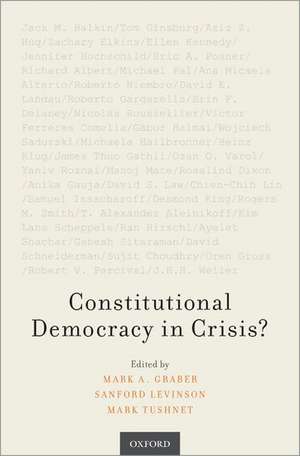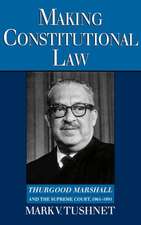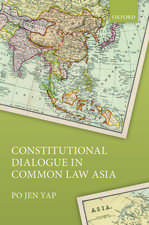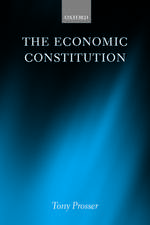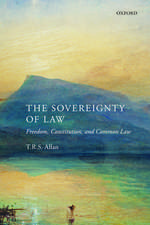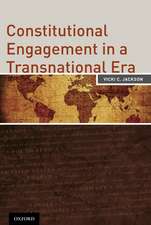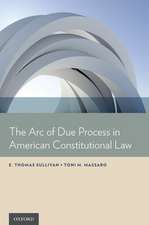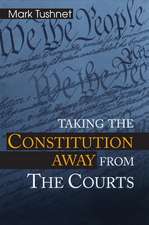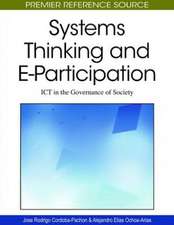Constitutional Democracy in Crisis?
Editat de Mark A. Graber, Sanford Levinson, Mark Tushneten Limba Engleză Paperback – 25 oct 2018
Preț: 286.83 lei
Preț vechi: 329.89 lei
-13% Nou
Puncte Express: 430
Preț estimativ în valută:
54.89€ • 57.10$ • 45.32£
54.89€ • 57.10$ • 45.32£
Carte disponibilă
Livrare economică 13-19 martie
Preluare comenzi: 021 569.72.76
Specificații
ISBN-13: 9780190919719
ISBN-10: 019091971X
Pagini: 736
Dimensiuni: 234 x 155 x 43 mm
Greutate: 1.04 kg
Editura: Oxford University Press
Colecția OUP USA
Locul publicării:New York, United States
ISBN-10: 019091971X
Pagini: 736
Dimensiuni: 234 x 155 x 43 mm
Greutate: 1.04 kg
Editura: Oxford University Press
Colecția OUP USA
Locul publicării:New York, United States
Recenzii
This edited volume is an informative, insightful, and comprehensive reference tool for those seeking to understand the conditions, causes, and consequences of the contemporary decline in many constitutional democratic orders worldwide. It makes a valuable contribution to the multidisciplinary scholarship in democratization, legal theory, and comparative politics, particularly with its theoretical tools and empirical assessments that improve our understanding of the current defects of democratic regimes.
Constitutional Democracy in Crisis? ... is a landmark account, compulsory reading for any student of comparative constitutional analysis. Containing a wide range of country studies from constitutional lawyers, it also includes multi-disciplinary investigations into the factors shaping the last decade of decline.
Many are convinced that liberal constitutional democracy is in the midst of a severe crisis, and is being replaced by illiberal constitutional democracy. This important book analyses the reasons for this development, both at the global level and at the national level. It presents original and illuminating answers to the question, 'Why is this shift occurring?' This scholarly foundation is necessary for finding answers to the question of how this trend can be reversed. The time is right for this book to be published by its first-class authors, and it provides the intellectual foundations necessary for each of us to cope with the changes that are occurring in our own constitutional democracies, and to try to turn the tide. For me, as a retired judge, the book provides food for thought about where we went wrong, and what we can do to take us in a new direction.
Constitutional democracies around the world are suffering assaults from within. Globally, political freedoms are becoming weaker. Democracy does not necessarily guarantee prosperity. This book provides a superb appraisal of democracy's current crisis. Those who wish to learn about what is happening to constitutional democracies around the world should read this groundbreaking, multiperspective, and transdisciplinary book.
To question the current health of constitutional democracy is implicitly to affirm that there are more chapters to be written before we arrive at the end of history. Fortunately, we now have the exquisitely crafted chapters in this unique collection of essays to help us make sense of our current predicament. Written against the backdrop of a multitude of ominous developments that have shaken confidence in the stability and endurance of liberal democratic institutions, the contributors to this timely volume explore this portentous moment from all angles, leaving the reader richly informed, if not sanguine, about future prospects. A careful reading will, however, not end in despair, for as the most disturbing threats to political freedom and economic justice emanate from within, the challenge that they represent can also be met from within.
This book is an indispensable resource for understanding the rise of illiberal populisms and the possibilities for sustaining constitutionalism and democracy. Contributors include leading global scholars of comparative constitutional law, whose chapters provide a diverse empirical base from countries around the world with which to evaluate constitutional democracy and its contemporary challenges and competitors. Theories are tested, data provided, and new concepts advanced - addressing, among other topics, the role of political parties, political leaders, religion, economic inequality, race, ethnicity, and immigration - in a set of readable and relatively short chapters that, as much as any edited scholarly collection could be, is a true "page-turner", hard to stop reading once one starts.
This rigorous, wide-ranging, and engaging volume is an indispensable guide to the current crisis of constitutional democracy. The volume's theoretical essays raise profound new questions about the relationship between constitutionalism and democracy. Its high quality empirical chapters help us understand the global reach and historical roots of the current crisis. This is a landmark book for our troubled times.
At the end of the 20th century, constitutional democracy had gained almost universal acceptance. At least, so it seemed. A decade later, we see constitutional democracy declining or mutating into more authoritarian forms of government in a number of countries. In this timely book, more than forty outstanding authors from many parts of the world offer a comprehensive analysis of this development and its causes, which should be of paramount interest not only to scholars and students of law and politics, but to everyone concerned about public affairs.
Constitutional Democracy in Crisis? ... is a landmark account, compulsory reading for any student of comparative constitutional analysis. Containing a wide range of country studies from constitutional lawyers, it also includes multi-disciplinary investigations into the factors shaping the last decade of decline.
Many are convinced that liberal constitutional democracy is in the midst of a severe crisis, and is being replaced by illiberal constitutional democracy. This important book analyses the reasons for this development, both at the global level and at the national level. It presents original and illuminating answers to the question, 'Why is this shift occurring?' This scholarly foundation is necessary for finding answers to the question of how this trend can be reversed. The time is right for this book to be published by its first-class authors, and it provides the intellectual foundations necessary for each of us to cope with the changes that are occurring in our own constitutional democracies, and to try to turn the tide. For me, as a retired judge, the book provides food for thought about where we went wrong, and what we can do to take us in a new direction.
Constitutional democracies around the world are suffering assaults from within. Globally, political freedoms are becoming weaker. Democracy does not necessarily guarantee prosperity. This book provides a superb appraisal of democracy's current crisis. Those who wish to learn about what is happening to constitutional democracies around the world should read this groundbreaking, multiperspective, and transdisciplinary book.
To question the current health of constitutional democracy is implicitly to affirm that there are more chapters to be written before we arrive at the end of history. Fortunately, we now have the exquisitely crafted chapters in this unique collection of essays to help us make sense of our current predicament. Written against the backdrop of a multitude of ominous developments that have shaken confidence in the stability and endurance of liberal democratic institutions, the contributors to this timely volume explore this portentous moment from all angles, leaving the reader richly informed, if not sanguine, about future prospects. A careful reading will, however, not end in despair, for as the most disturbing threats to political freedom and economic justice emanate from within, the challenge that they represent can also be met from within.
This book is an indispensable resource for understanding the rise of illiberal populisms and the possibilities for sustaining constitutionalism and democracy. Contributors include leading global scholars of comparative constitutional law, whose chapters provide a diverse empirical base from countries around the world with which to evaluate constitutional democracy and its contemporary challenges and competitors. Theories are tested, data provided, and new concepts advanced - addressing, among other topics, the role of political parties, political leaders, religion, economic inequality, race, ethnicity, and immigration - in a set of readable and relatively short chapters that, as much as any edited scholarly collection could be, is a true "page-turner", hard to stop reading once one starts.
This rigorous, wide-ranging, and engaging volume is an indispensable guide to the current crisis of constitutional democracy. The volume's theoretical essays raise profound new questions about the relationship between constitutionalism and democracy. Its high quality empirical chapters help us understand the global reach and historical roots of the current crisis. This is a landmark book for our troubled times.
At the end of the 20th century, constitutional democracy had gained almost universal acceptance. At least, so it seemed. A decade later, we see constitutional democracy declining or mutating into more authoritarian forms of government in a number of countries. In this timely book, more than forty outstanding authors from many parts of the world offer a comprehensive analysis of this development and its causes, which should be of paramount interest not only to scholars and students of law and politics, but to everyone concerned about public affairs.
Notă biografică
Mark A. Graber is University of Maryland Regents Professor at the Francis King Carey School of LawSanford Levinson is W. St. John Garwood and W. St. John Garwood, Jr., Centennial Chair in Law at the University of Texas Law SchoolMark Tushnet is the William Nelson Cromwell Professor of Law at Harvard Law School
